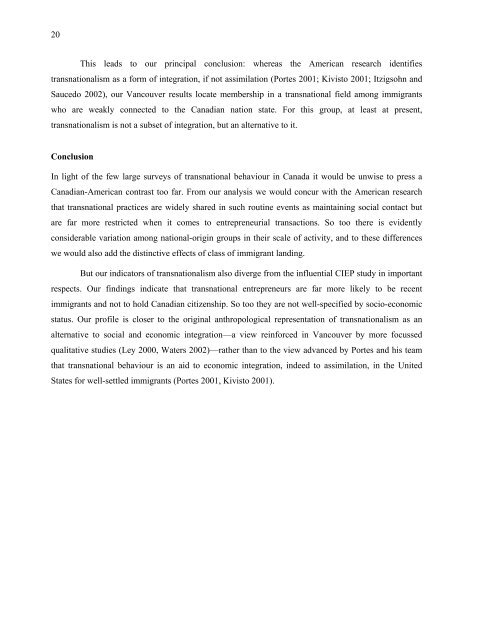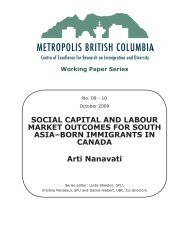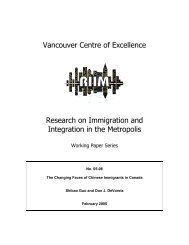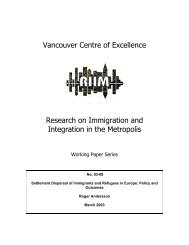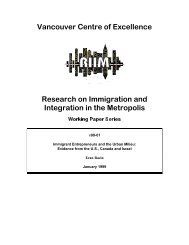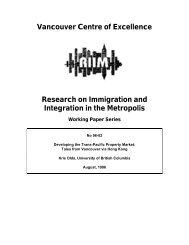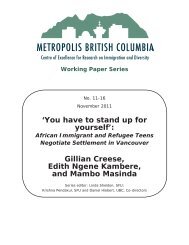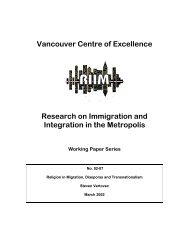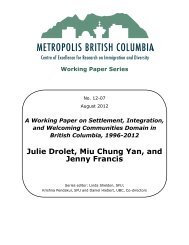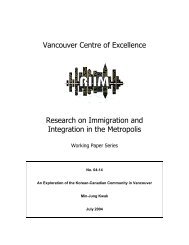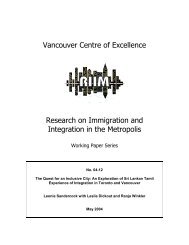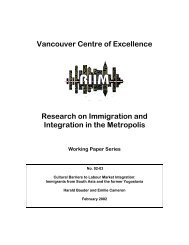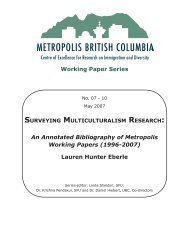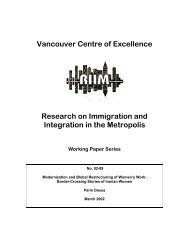Characteristics of Immigrant Transnationalism in ... - Metropolis BC
Characteristics of Immigrant Transnationalism in ... - Metropolis BC
Characteristics of Immigrant Transnationalism in ... - Metropolis BC
Create successful ePaper yourself
Turn your PDF publications into a flip-book with our unique Google optimized e-Paper software.
20<br />
This leads to our pr<strong>in</strong>cipal conclusion: whereas the American research identifies<br />
transnationalism as a form <strong>of</strong> <strong>in</strong>tegration, if not assimilation (Portes 2001; Kivisto 2001; Itzigsohn and<br />
Saucedo 2002), our Vancouver results locate membership <strong>in</strong> a transnational field among immigrants<br />
who are weakly connected to the Canadian nation state. For this group, at least at present,<br />
transnationalism is not a subset <strong>of</strong> <strong>in</strong>tegration, but an alternative to it.<br />
Conclusion<br />
In light <strong>of</strong> the few large surveys <strong>of</strong> transnational behaviour <strong>in</strong> Canada it would be unwise to press a<br />
Canadian-American contrast too far. From our analysis we would concur with the American research<br />
that transnational practices are widely shared <strong>in</strong> such rout<strong>in</strong>e events as ma<strong>in</strong>ta<strong>in</strong><strong>in</strong>g social contact but<br />
are far more restricted when it comes to entrepreneurial transactions. So too there is evidently<br />
considerable variation among national-orig<strong>in</strong> groups <strong>in</strong> their scale <strong>of</strong> activity, and to these differences<br />
we would also add the dist<strong>in</strong>ctive effects <strong>of</strong> class <strong>of</strong> immigrant land<strong>in</strong>g.<br />
But our <strong>in</strong>dicators <strong>of</strong> transnationalism also diverge from the <strong>in</strong>fluential CIEP study <strong>in</strong> important<br />
respects. Our f<strong>in</strong>d<strong>in</strong>gs <strong>in</strong>dicate that transnational entrepreneurs are far more likely to be recent<br />
immigrants and not to hold Canadian citizenship. So too they are not well-specified by socio-economic<br />
status. Our pr<strong>of</strong>ile is closer to the orig<strong>in</strong>al anthropological representation <strong>of</strong> transnationalism as an<br />
alternative to social and economic <strong>in</strong>tegration—a view re<strong>in</strong>forced <strong>in</strong> Vancouver by more focussed<br />
qualitative studies (Ley 2000, Waters 2002)—rather than to the view advanced by Portes and his team<br />
that transnational behaviour is an aid to economic <strong>in</strong>tegration, <strong>in</strong>deed to assimilation, <strong>in</strong> the United<br />
States for well-settled immigrants (Portes 2001, Kivisto 2001).


